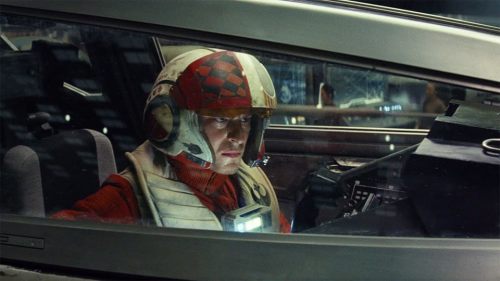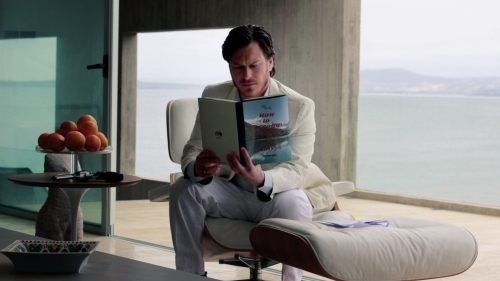CAMERA OBSCURA Review: Photos of the Dead
Caveat: Noted man of action and BMD family member Noah Segan wears a pizza uniform in this movie, so my judgment may be compromised.
The current indie horror scene is churning out intriguing throwbacks at a rate that’s somewhat hard to keep up with – micro movies that are in dialogue with the genre’s past as much as they speak to current terrors. Aaron B. Koontz’s Camera Obscura is the latest in this line of retro-futurist tales of death and despair, recalling PTSD polemics like Bob Clark’s Deathdream (’74) and Adrian Lyne’s Jacob’s Ladder (’90), mixed with J-Horror spook show theatrics and slasher gore for good measure. Koontz’s film is a mash-up that never becomes imitation, wisely focusing on character beats instead of cheap scares. The result is a clever 90-minute Twilight Zone episode where a recovering vet (Christopher Denham) realizes the vintage camera his wife (Nadja Bobyleva) gave him as an anniversary present captures grim imminent demises that he then works to prevent.
Jack (Denham) is having trouble adjusting since coming home from Iraq. A war photographer and witness to atrocities only those who’ve experienced combat can comprehend, he hasn’t been able to find a job, despite showing signs of improvement at therapy. As Hitchcock put it, we’re dealing with the viewpoint of “an emotional man”; Jack’s POV is so shattered by his last six-month stint that the normalcy of domestic life in the United States is unsettling. His new camera is first viewed as a gateway back to doing what he loves by his better half, who urges him to work at her real estate firm snapping condos. However, once the rolls from this relic are developed, they feature black and white mortality tableaus of both strangers and his loving spouse. The documentarian must now act, choosing substitute victims in order to prevent these grisly fates from occurring, turning a man who vowed to “never pick up a camera again” into a pre-cog serial killer literally trading tragedies.
There’s a dream logic to Koontz and Cameron Burns’ script, as waking nightmares combine with the haunted camera to create an uneasy state of unreality that permeates every frame of this briskly paced suspense exercise. For some, the unreliable narrator conceit of Camera Obscura will be a delight, as Jack becomes a woozy, untrustworthy guide whose judgment becomes increasingly poor. Others may find the tried and tenuous storytelling device to be a bit too familiar, especially once we discover that the lens he’s helming may have belonged to a local serial murderer (Andrew Sensening). However, the shift from psychological frights to physically brutal violence around the halfway point lends Koontz’s motion picture a weight that’s hard to shake once Jack starts butchering and staging bodies to resemble the photos he’s snapped. We’re no longer dreaming with the man, but acting as his accomplice – the savage slaughter of a hardware shopkeeper (Jeremy King) bringing the reality of this unfortunate series of catastrophes crashing down to a shameful plateau, where we feel a hammer crack a working stiff’s skull.
There are certain formal elements sure to push the nostalgia buttons of its target audience – Steve Moore’s sharp synth score evoking both John Carpenter and Vangelis. But Koontz’s focus on his actors’ performances and subtly sharp character writing elevate Camera Obscura above the numerous 70s/80s pastiche pictures that have become all the rage. There are no digital film scratches or VHS yearning; rather an astute attention to hitting its beats without calling attention to the thematic “war at home” subtext that could’ve become ham-fisted all too easily. Jack is a soldier without a purpose, his shutterbug tendencies now being utilized in the service of exacting death instead of simply capturing its aftermath, the morality of his actions becoming murkier and murkier, until there’s no refusing damnation. All the while, Chris Heinrich’s cinematography has a loose, jangly feel that keeps the events grounded, and causes the actuality of Jack’s crimes to hit home in a way they wouldn’t had a more heightened aesthetic been chosen.
Camera Obscura isn’t going to alter the way you look at genre cinema, nor is it a “new classic” (or whatever hyperbolic bullshit term people use nowadays to over-qualify the art they enjoy). Instead, Koontz’s feature debut is a sturdy, adult scare picture, which is a treat unto itself. The movie zags when you expect it to zig, leading to a satisfyingly haunting conclusion that somewhat upends everything which came before. Is it perfect? Far from it. The PTSD threads could’ve been mined for a bit more subtext, and some of the murder set pieces stretch plausibility. But the film’s entire tone can be summed up in the way Noah Segan (who plays Jack’s good natured slacker drinking buddy) croaks “why do you have a gun?” once the photographer threatens to turn his wrath on him. As much as Camera Obscura revolves around a fantastical fortune telling device, it’s more about a peaceful man realizing his capacity for violence, once there’s a motivating factor that allows him to believe it’s being employed in the name of preventing more bad things from happening. It's American intervention writ small, with one soldier waging war against forces nobody can hope to control.
Camera Obscura is available now on VOD courtesy of Chiller Films.


_500_281_81_s_c1.jpg)
